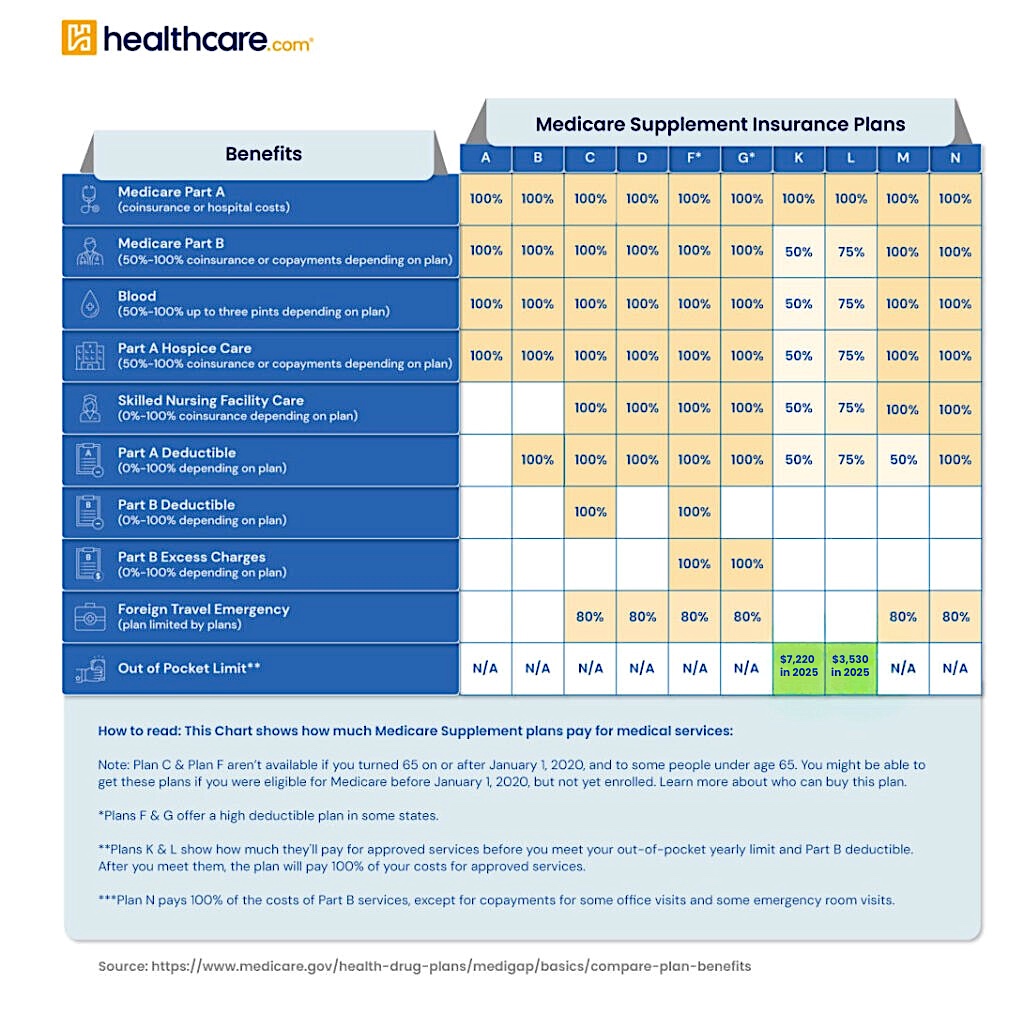Written by Michael LaPick
Healthcare Writer
We aim to help you make informed healthcare decisions. While this post may contain links to lead generation forms, this won’t influence our writing. We follow strict editorial standards to give you the most accurate and unbiased information.
What You Need to Know
- Medicare Supplement plans, also known as Medigap, help pay for out-of-pocket costs not covered by Medicare Part A and Part B.
- West Virginia insurance companies must accept your Medicare Supplement (Medigap) plan application if you’re in your Medigap Open Enrollment Period or have guaranteed issue rights.
- The three most popular Medigap policies are typically Plans F, G, and N.
What Are Medicare Supplement Plans in West Virginia?
Medicare is a federal health insurance program for individuals aged 65 and older, as well as younger people with qualifying disabilities or health conditions (e.g., end-stage renal disease).
Original Medicare, which includes Part A (Hospital Insurance) and Part B (Medical Insurance), covers many healthcare services. However, it still leaves you with out-of-pocket costs like deductibles, coinsurance, and copayments.
Medicare Supplement planshelp pay for these expenses.
Medigap plans are standardized by letter (A through N). That means Plan A from one company offers the same benefits as Plan A from another, though premiums may differ.
Learn how these plans work and how they benefit residents of West Virginia.
When Can You Enroll in a Medicare Supplement (Medigap) Policy?
You can apply for a Medigap plan at any time. However, outside of your Medigap Open Enrollment Period—or without guaranteed issue rights—insurers may use your health history to deny coverage or charge higher premiums.
Your Medigap Open Enrollment Period lasts for six months. It starts the month you’re both age 65 (or older) and enrolled in Medicare Part B. During this time, insurance companies must offer you any plan they sell at standard rates, regardless of your health.
This is the ideal time to enroll because it gives you the widest choice of plans and the best rates.
Guaranteed issue rights arise from specific situations, like losing other health coverage. If you qualify, insurers must sell you a policy and can’t charge more due to your health status.
What Are the Most Popular Medicare Supplement Plans?
Nationwide, the most common Medigap plans are:
- Plan F – Offers the most comprehensive coverage, but is only available to those eligible for Medicare before January 1, 2020.
- Plan G – Covers almost everything Plan F does, except the Medicare Part B deductible.
- Plan N – Covers most major costs but has copayments for some doctor and ER visits, and does not cover Part B excess charges.
How Do You Choose a Medicare Supplement Plan?
Decide on a plan letter (e.g., G or N) based on your healthcare needs and budget.
Explore plan options online or call a licensed insurance agent for guided assistance. Compare premiums for the same plan across insurers. The benefits are identical, but pricing differs due to:
- Attained age rating: Premiums increase as you age.
- Issue age rating: Premiums are based on your age when you first buy the plan.
- Community rating: Everyone pays the same premium regardless of age.
Always compare “apples to apples” — for example, Plan G with one insurer vs. Plan G with another.

What If You Want to Change Your Medicare Supplement Plan?
You can apply to change Medigap policies at any time. But unless you have guaranteed issue rights, insurers may underwrite your application based on your health.
What Are Alternatives to Medicare Supplement Plan?
Medicare Advantage plans, also known as Part C, are an alternative to Original Medicare, offered by private insurance companies.
These plans include Part A (hospital) and Part B (medical), and most also include Part D (prescription drug coverage). Many plans offer added benefits like routine dental, vision, hearing, and fitness programs.
Instead of buying a Medigap and a Part D plan separately, you may consider an all-in-one Medicare Advantage plan. Learn more about West Virginia Medicare Advantage plans.
Medicare Part D
Medicare Part D plans offer standalone prescription drug coverage.
Who needs it: If you’re enrolled in Original Medicare (Parts A and/or B) and want drug coverage, you typically buy a separate Part D plan.
What it covers: Prescription medications. Coverage and cost vary by plan.
How it’s offered: Through private insurance companies approved by Medicare.
Not needed if: You’re enrolled in a Medicare Advantage plan that already includes drug coverage (MAPD).
Do Medigap Plans Cover Prescription Drugs?
No. Medigap plans do not cover prescription drugs. You’ll need a separate Medicare Part D plan for that.
Medicare Resources in West Virginia
Residents of West Virginia can get free, personalized help through the following programs:
- State Health Insurance Assistance Program (SHIP):Offers one-on-one Medicare counseling for West Virginians.
- West Virginia Offices of the Insurance Commissioner: Provides consumer protection, handles complaints, and regulates Medigap insurers.
- West Virginia Medicaid Program: Offers health coverage for low-income individuals and may coordinate with Medicare benefits.
Next Steps
If a Medicare Supplement plan in West Virginia fits your needs, take the next step by comparing plans available in your area. You can browse options online or connect with a licensed insurance agent for expert guidance and personalized support.
Thank you for your feedback!







